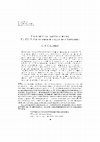Books by Sergey Stepantsov

https://elibrary.ru/ZMFYGO В издании представлен подробный комментарий к избранным фрагментам сти... more https://elibrary.ru/ZMFYGO В издании представлен подробный комментарий к избранным фрагментам стихотворений Алкея из Митилены, одного из самых значительных древнегреческих лириков (кон. VII-нач. VI в. до н. э.). Перед комментарием дан очерк особенностей лесбосского диалекта, необходимых для понимания поэзии Алкея, что делает возможным изучать стихотворения в подлиннике читателю, освоившему лишь элементарный курс древнегреческого языка. В первую часть издания включен комментарий к политическим фрагментам, рисующим картину борьбы за власть в Митилене, в числе этих фрагментов-знаменитое стихотворение о корабле в бурном море (фрагмент 208а). В качестве приложения в издание вошел специально подготовленный для него очерк Е.И. Соломатиной «Лесбос Алкея», рисующий широкую картину культурного и политического развития Лесбоса с древнейших времен до времени Алкея. Книга адресована широкому кругу изучающих древнегреческую словесность.
A commentary on Pindar's 12th Pythian Ode.
A commentary on Alc. fr. 208a Voigt.
Papers by Sergey Stepantsov

Studia Litterarum
In the prologue of Aristophanes’ Thesmophoriazusae (134–140) Euripides’ Inlaw after seeing the po... more In the prologue of Aristophanes’ Thesmophoriazusae (134–140) Euripides’ Inlaw after seeing the poet Agathon expresses his bewilderment at the mixture of gender signals emitted by Agathon’s clothes and the objects he is surrounded with. Inlaw enumerates several couples of objects incompatible because of their relatedness to one or another gender: barbitos and saffron gown, lyre and headband, lekythos (an attribute of athletics) and breast band, sword and mirror. In this paper I reconsider commentators’ opinions on the question whether there was indeed a sword among the props visible to the public or the sword was mentioned by Inlaw because it was present in the passage from Aeschylus’ Edonians explicitly parodied in the questions asked by Inlaw. A. Sommestein’s speculation that Agathon needs a sword to get into a male role is rejected as contradicting Agathon’s words in v. 154–155. I also call in question G. Kaibel’s surmise (supported by C. Prato, C. Austin and D. Olson) that the sw...

Vestnik Pravoslavnogo Svâto-Tihonovskogo Gumanitarnogo Universiteta. Seria I: Bogoslovie, Filosofiâ, 2013
Saint Augustine of Hippo often quoted the last verses of the 125th psalm and several times medita... more Saint Augustine of Hippo often quoted the last verses of the 125th psalm and several times meditated its content in his tractates and sermons. The author of this article examines a selection of these citations, in which the verses are not only quoted but also, both directly and indirectly, commented upon. In his exposition of the Epistle to the Galatians, Augustine merely mentions the fact of the possibility of a spiritual understanding of the passage. The most thorough and most complete exposition of this passage is found in Augustine's 31st Homily. This exposition is actually more thematic than exegetical. The main points of this homily include the idea of an explanation of the various reasons for tears shed by people during their earthly lives (the tears of martyrs, the tears deriving from earthly pains and sorrows, the tears of a just man separated from his God). But the most profound interpretation of these psalm verses is found in Augustines's exposition of Psalm 125 (...

Studia Litterarum, 2021
The author examines two variant readings in Alcaeus fr. 140 Voigt, a well-known poem listing piec... more The author examines two variant readings in Alcaeus fr. 140 Voigt, a well-known poem listing pieces of arms. These two variants in line 9 are: ἔρκος (direct tradition represented by a papyrus fragment) and ἄρκος (from the quotation in Athenaeus). The word in question is used in the expression describing greaves: ἔρκος/ἄρκος ἰσχύρω βέλεος “a (de)fence against the arrow’s might”. A brief history of these variants in Alcaeus’ editions is outlined. The variant ἔρκος, attested by the papyrus, is supported by Homeric usage of ἕρκος in some parallel constructions of the Iliad, where it is used to describe means of defense. This variant is preferred in modern editions of Alcaeus’ fragments, including those by E.-M. Voigt (1971) and G. Liberman (1999). However, ἄρκος of the indirect tradition is a lectio difficilior and apparently has no less rights to be included in the fragment. Unlike ἄρκος, ἔρκος could have been a result of banalisation of the text (even as early as before the 2 nd centu...
Stepantsov S.A. Sound Effects in Alcaeus’ Hymn to Dioscuri. Aristeas 21 (2020) 32–39, 2020
The author undertakes a one-by-one survey of sound combinations and repetitions which seem to pro... more The author undertakes a one-by-one survey of sound combinations and repetitions which seem to produce expressive sound effects in Alceus’ Hymn to Dioscuri (fr. 34а V.). The extant part of the hymn appears to be richly decorated by various sound effects, including one case of almost onomatopoetic nature. Some of the expressions involved in sound play use epic formulae so as to reinforce their phonetic potential. These effects contribute to the stylistic perfection of the poetical piece.
Jornal of Ancient History (Vestnik Drevnei Istorii). (In Russian) 78/4 (2018). P. 860-865, 2018

ШАГИ/STEPS, 2017
Along with Solon of Athens, Alcaeus of Mytilene was one
of the frst lyric poets with a clearly ex... more Along with Solon of Athens, Alcaeus of Mytilene was one
of the frst lyric poets with a clearly expressed political interest.
However fragmentary his heritage, the remnants of his poetry and
commentaries on it allow us to infer that he made a considerable
contribution to development of political metaphor and allegory.
This contribution was by no means limited to the allegory of the
ship, which, it appears, did not always have to do with politics,
even when the ship or sailing were arguably allegorical. The article
gives a detailed survey of political metaphors which are attested for
the frst time in Alcaeus’ poetry: frr. 70.7 Voigt, 129.23–24 Voigt,
141.3–4 Voigt, 351 Voigt, 360B Lib., 305a.1–14 Lib. Special attention
is paid to metaphors connected with the topic of wine-drinking
and sympotic games. Apparently, it was in Alcaeus’ poetry that political
activity was frst represented as a game of luck and skill. It is
noteworthy that the political metaphors using the imagery of wine
and games introduce into political language imagery connected
with the symposion, where Alcaeus’ songs were frst performed.
Вестник истории, литературы и искусства, 2008
Вольность и точность. Гаспаровские чтения-2014, 2015
The paper analyses three cases of alliteration in Alcaeus used with arguably onomatopoetic effect... more The paper analyses three cases of alliteration in Alcaeus used with arguably onomatopoetic effect: 70.10; 34a.6 and 34b.9 Voigt.
Reconsidering principles, possibilities and purposes of studying the sound effects in
archaic Gre... more Reconsidering principles, possibilities and purposes of studying the sound effects in
archaic Greek poetry, the author analyses the consonant element of Alc. 208a Voigt, which
from this viewpoint proves to be at least as elaborate and even sophisticated as Alc. 140, “a
highest quality specimen of early Greek sympotic poetry” (J. Latacz).











Uploads
Books by Sergey Stepantsov
Papers by Sergey Stepantsov
of the frst lyric poets with a clearly expressed political interest.
However fragmentary his heritage, the remnants of his poetry and
commentaries on it allow us to infer that he made a considerable
contribution to development of political metaphor and allegory.
This contribution was by no means limited to the allegory of the
ship, which, it appears, did not always have to do with politics,
even when the ship or sailing were arguably allegorical. The article
gives a detailed survey of political metaphors which are attested for
the frst time in Alcaeus’ poetry: frr. 70.7 Voigt, 129.23–24 Voigt,
141.3–4 Voigt, 351 Voigt, 360B Lib., 305a.1–14 Lib. Special attention
is paid to metaphors connected with the topic of wine-drinking
and sympotic games. Apparently, it was in Alcaeus’ poetry that political
activity was frst represented as a game of luck and skill. It is
noteworthy that the political metaphors using the imagery of wine
and games introduce into political language imagery connected
with the symposion, where Alcaeus’ songs were frst performed.
archaic Greek poetry, the author analyses the consonant element of Alc. 208a Voigt, which
from this viewpoint proves to be at least as elaborate and even sophisticated as Alc. 140, “a
highest quality specimen of early Greek sympotic poetry” (J. Latacz).
of the frst lyric poets with a clearly expressed political interest.
However fragmentary his heritage, the remnants of his poetry and
commentaries on it allow us to infer that he made a considerable
contribution to development of political metaphor and allegory.
This contribution was by no means limited to the allegory of the
ship, which, it appears, did not always have to do with politics,
even when the ship or sailing were arguably allegorical. The article
gives a detailed survey of political metaphors which are attested for
the frst time in Alcaeus’ poetry: frr. 70.7 Voigt, 129.23–24 Voigt,
141.3–4 Voigt, 351 Voigt, 360B Lib., 305a.1–14 Lib. Special attention
is paid to metaphors connected with the topic of wine-drinking
and sympotic games. Apparently, it was in Alcaeus’ poetry that political
activity was frst represented as a game of luck and skill. It is
noteworthy that the political metaphors using the imagery of wine
and games introduce into political language imagery connected
with the symposion, where Alcaeus’ songs were frst performed.
archaic Greek poetry, the author analyses the consonant element of Alc. 208a Voigt, which
from this viewpoint proves to be at least as elaborate and even sophisticated as Alc. 140, “a
highest quality specimen of early Greek sympotic poetry” (J. Latacz).
The problems discussed:
1. Arms at home or at a sanctuary.
2. Could βεβλήμεναι mean 'thrown away on the battlefield'.
3. ΑΡΚΟΣ/ΕΡΚΟΣ
Анализ двух фрагментов показал, что в подходе к лакунам в них Гаспаров был вполне последователен. Из предлагавшихся для восполнения лакун конъектурных восполнений он принимал только самые очевидные и избегал смелых и недоказуемых. В случае, когда отвержение недоказуемой конъектуры приводило к "пустотам" в переводе, он по возможности незаметно заполнял их словесным материалом, распространяющим или дублирующим наличный. Если текст не поддавался никакому пониманию, Гаспаров оставлял лакуны в переводе, за исключением начала стихотворения, в котором, вероятно, ему казалось нежелательным оставлять пробел.
В ходе исследования также выдвинуто предположение, что Гаспаров не выходил за пределы текста Лобеля и Пейджа, то есть никак не учитывал при переиздании своих переводов лемму стихов Alc. 130 b 9-11 Voigt из P.Oxy. 3711, а ошибочная по смыслу и противная размеру вставка "подобно волку в облаве" не принадлежит переводчику.